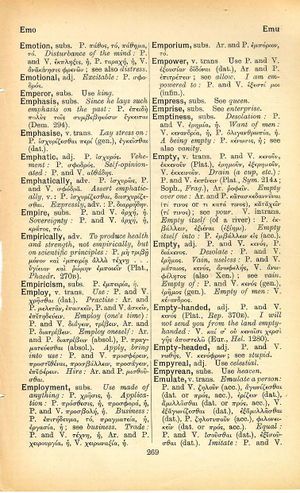emphasis: Difference between revisions
From LSJ
οἵτινες πόλιν μίαν λαβόντες εὐρυπρωκτότεροι πολύ τῆς πόλεος ἀπεχώρησαν ἧς εἷλον τότε → after taking a single city they returned home, with arses much wider than the city they captured
(CSV4) |
(6_6) |
||
| Line 2: | Line 2: | ||
|Text=[[File:woodhouse_269.jpg|thumb|link={{filepath:woodhouse_269.jpg}}]]'''subs.''' | |Text=[[File:woodhouse_269.jpg|thumb|link={{filepath:woodhouse_269.jpg}}]]'''subs.''' | ||
<b class="b2">Since he lays such emphasis on the past</b>: P. ἐπειδὴ πολὺς τοῖς συμβεβηκόσιν ἔγκειται (Dem. 294). | <b class="b2">Since he lays such emphasis on the past</b>: P. ἐπειδὴ πολὺς τοῖς συμβεβηκόσιν ἔγκειται (Dem. 294). | ||
}} | |||
{{Lewis | |||
|lshtext=<b>emphăsis</b>: is, f., = [[ἔμφασις]]>, a [[figure]] of rhet.,<br /><b>I</b> [[emphasis]], [[rhetorical]] [[stress]] (cf.: [[pondus]], [[significatio]]), Quint. 9, 2, 64; 8, 2, 11; 8, 3, 86 al. | |||
}} | }} | ||
Revision as of 08:29, 13 August 2017
English > Greek (Woodhouse)
subs.
Since he lays such emphasis on the past: P. ἐπειδὴ πολὺς τοῖς συμβεβηκόσιν ἔγκειται (Dem. 294).
Latin > English (Lewis & Short)
emphăsis: is, f., = ἔμφασις>, a figure of rhet.,
I emphasis, rhetorical stress (cf.: pondus, significatio), Quint. 9, 2, 64; 8, 2, 11; 8, 3, 86 al.

